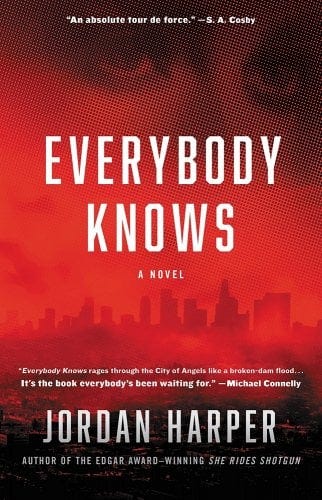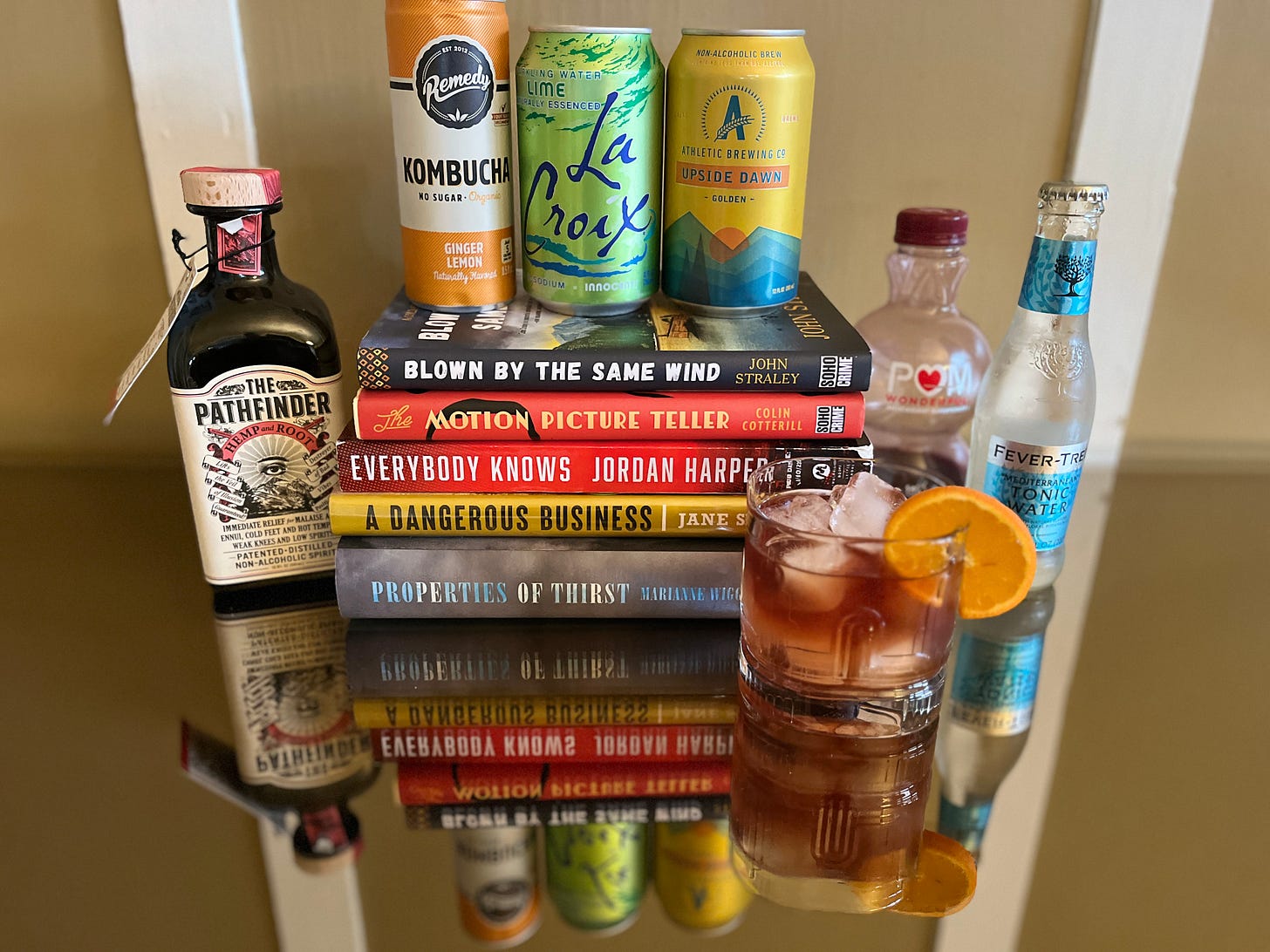Neal’s Blood & Whiskey #20
An LA mystery + Q&A with Jordan Harper. Jane Smiley’s murder mystery. Two gems from Soho Crime. Mocktails for Dampuary.
Hello friends and readers,
Welcome to 2023. Did you make a resolution to read more? Maybe drink less? Finally learn to play ukulele? I can help with the first two of those. (The last one is mine — the ukulele was a 2021 Xmas gift…)
First, here’s a great book to start the new year with:
Everybody Knows (Mulholland) — Jordan Harper
Mae Pruett is a “black bag” publicist for a Hollywood PR firm. She’s a fixer to the stars. She makes problems go away — a bad story, a bad night. Her boss tempts her with an idea: let’s get out of the game, I know a way out. Then he’s killed and Mae teams up with an ex-lover Chris to take on the most powerful (and evil) forces in L.A., a town where we’re told, Nobody talks. But everybody whispers.
There’s a LOT packed into this book… powerful men abusing their power; corrupt cops; drug-addled celebs. Also, someone is setting fires at homeless camps. It’s edgy, fun and funny. I’d put it right up there with other L.A. noir-ish faves (James Ellroy, Ivy Pochoda, Dorothy B. Hughes, Walter Mosley, Don Winslow, Kem Nunn, Joe Ide, Steph Cha, plus the classics, Chandler, MacDonald, etc.). All the requisites are here: rich fuckers, sickos, outstanding one-liners, some good food. Harper is a TV writer and gives a sharp-eyed, insidery view of today’s L.A., just snarky enough. Next to a yoga place people eat “bowls of wet health.” There’s also a gritty beauty to his depictions of that singular, flawed and fiery city.
**Scroll down to read my Q&A with Jordan**
A Dangerous Business (Knopf) — Jane Smiley
I guess I shouldn’t be surprised that Smiley is capable of a quirky-sweet murder mystery. Still, I was surprised at how much I enjoyed the story of her young prostitute-sleuth Eliza Ripple, set in Monterey, California in 1851. Eliza’s abusive husband got himself shot in the head at a card game. Good riddance. She’s been working ever since for Mrs. Parks, more school marm than madam. Eliza makes good money without too many hassles from her johns. Then the bodies of young women start to showing up. Eliza partners with a bad-ass sidekick, Jean (also a prostitute — for women), and the two develop a deep, unique friendship in a gritty, male-run time and place as they try to solve the murders. The story is fairly calm, measured, easy-going. But with a nice mix of whimsy and dread. It’s got a Little Women go West vibe and, at a breezy 250 pages, goes down smooth.
Two from the fights-above-its-weight imprint, Soho Crime
The crime imprint at Soho Press has collected an amazing stable of prolific mystery and crime writers. Example: Mick Herron, whose books are now being adapted into a surprisingly well-done TV series, Slow Horses, on Apple TV. (Season 2 was fantastic.) The New Yorker just profiled Herron, not-so-subtly suggesting that he might be the “best spy novelist of his generation.” Others on the Soho team include James Sallis, Cara Black (Parisian murder mysteries), James R. Benn (WWII mysteries), and last year’s break-out Don’t Know Tough, by Eli Cranor (which I need to read soon). Here are two more:
Blown By the Same Wind — John Straley
Straley has been writing cranky-smart novels set in coastal Alaska for years, but this was my first — and I loved it. It’s 1968 and a mysterious monk arrives at the fishing village of Cold Storage. He turns out to be author/monk Thomas Merton, in hiding. Then two racist fishermen arrive. Then an FBI agent. And a mummified corpse that may or may not be John Wilkes Booth. The locals are a wonderful mixed bag of hippies and fish folk and those aching to escape their icy little burg. It’s smart and snappy and sure-handed. Alaska shines.
The Motion Picture Teller — Colin Cotterill
From another under-the-radar veteran, Cotterill’s funny, sarcastic, sweet, oddball novel is set in a Thai suburb, 1996, featuring a half-hearted postman (Supot) and his video store clerk pal (Ali). The two geek out on films in a back room at Ali’s shop. One night they come across an unmarked video, a bootleg copy of Bangkok 2010, a dystopian film they watch over and over — it’s the best film they’ve ever seen. Except: they’ve never heard of the director or actors. Supot’s obsession with the film (and its beautiful star) leads him on a wild and mysterious journey.
Reminder: you can find all books mentioned in Blood & Whiskey at Bookshop.org: https://bookshop.org/lists/blood-whiskey
Q&A with Jordan Harper (who has his own substack newsletter, Welcome to the Hammer Party, which I just started reading…)
I assume the L.A./Hollywood/PR/power aspects of the story were informed by your own experiences writing for TV, but I also wonder how that screenwriting experience affected the actual writing of the novel. Did writing for TV help or hurt?
I'm very glad I worked in network TV for a while, as that is the most tightly-structured plotting you can be trained to do. It's like learning to do very formal architectural drawing before being set loose to paint abstract art. I think it's helped me construct novels that have a very strong pace to them.
To me, the book is an ode to L.A. — old and new, good and bad — and I loved the gritty-shabby beauty of some scenes and moments. What's your relationship with LA these days? Did you intend for readers to love it or hate it — or both?
I love Los Angeles very much, which as with any deep love involves sometimes hating it. It's the most American city, America distilled into its essences of cars and fame and money and power and food, all built on stolen land. It's got people from everywhere, and every type of people. It's too expensive and the worst people have the most. It's the world capital of noir. Readers can love it or hate it but they are going to feel it.
What books or writers have inspired your fiction? And did you read other LA crime/noir while writing Everybody Knows — or avoid it?
I've made no secret of my love of James Ellroy, and he is the most obvious inspiration for me while writing this book - although the book I re-read while drafting this book was American Tabloid, to avoid too much overlap. I also read David Peace's Red Riding Trilogy while writing Everybody Knows. Other than Ellroy, I credit Jim Thompson, Megan Abbott and Cormac McCarthy as my main inspirations.
Any plugs for TV (or film) that you loved lately?
Search Party was my favorite TV I've seen in a while, a great, smart genre show that wasn't afraid to re-invent itself. I'm watching more movies than TV these days. Indian action epic RRR was the film of 2022 for me, and I saw it several times in the theater. A great experience that reminds you of the power of going to the movies.
Do you listen to music while writing? If so: who, and where?
I always listen to music when I write, almost entirely instrumentals or electronic stuff, usually weird and vaguely psychedelic stuff like Odd Nosdam or Amulets. My favorite writing album is Luciferian Towers by Godspeed You! Black Emperor, and I listened to it a lot while writing this book. I also listened to soundtracks for Neon Demon and Good Time.
Two books coming in February, which I’m reading now will review soon:
I Have Questions for You, by Rebecca Makkai — from the author of National Book Award and Pulitzer Prize finalist The Great Believers, Makkai new book is literary murder mystery set at a New Hampshire boarding school. So far? Great!
Scorched Grace, by Margo Douaihy — from the new Gillian Flynn Books imprint of the new publisher Zando, this one gets great advance praise from Megan Abbott (“crackling”) and Don Winslow (“propulsive”). I’ll have an interview with Douaihy to share next month.
And I just started reading Beverly Gage’s, G-Man: J. Edgar Hoover and the Making of the American Century, her captivating bio of the FBI director who served eight presidents. I won’t be reviewing it soon, but here’s Alexis Coe (via her newsletter, Study Marry Kill): “Gage, an excellent biographer, seeks to understand, and in doing so, the Yale historian makes it impossible to consider Hoover an outlier in America. [Hoover] didn’t start a fraternity that pushed the Lost Cause; he joined it. The author doesn’t sympathize with the legendary law-and-order conservative. Gage humanizes Hoover by focusing on the process of becoming. His evolution is unrushed and ongoing, and that approach — he was constantly amassing, and not just wielding, power — makes all the difference.”
Mocktail of the Month
For someone with a birthday during Dry January, it’s always a challenge not to get a bit wet. I prefer to think of the annual month of sobriety as more damp than dry — Dampuary. But I try my best, during January and other times of the year, and I’ve relied on a few tricks. For mocktails, I love the evening ritual of mixing, so I’ve tried a few of the new alcohol-free spirits, like the hemp-and-root “spirit,” The Pathfinder. Their website has a few mocktail suggestions. I like to mix a shot of it with lemon juice, pomegranate and a splash of soda, or just tonic and a slice of orange. My other go-to is Athletic Brewing Co.’s no-alcohol beers. Sometimes I’ll mix half real beer with half non-alcohol, which nets two beers with half the booze. Damp.
Instead of a curated playlist this month, here’s a podcast episode I wrote for the excellent Wondery show American History Tellers. This was my first foray into podcast writing and it was a blast. My episode, Three Shots in Dallas, is about JFK’s assassination:
And here’s a little Jeff Beck (RIP) to go with it:
Thanks for reading. And if you’d like to support my writing about reading, which would help support my book buying (and support authors), consider…
Until next month,
-Neal
Find me on Instagram; sometimes on Facebook, Twitter, LinkedIn, Goodreads







Great stuff! I'm going to have to check out that Jane Smiley book!
Neal you are a gift to the rest of us. The whole left in my life by Marilyn Stasio’s retirement from the Times has been filled!